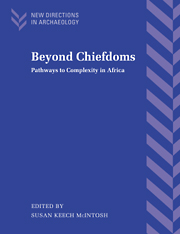Book contents
- Frontmatter
- Contents
- List of figures
- List of tables
- List of contributors
- Preface
- 1 Pathways to complexity: an African perspective
- 2 The segmentary state and the ritual phase in political economy
- 3 Perceiving variability in time and space: the evolutionary mapping of African societies
- 4 Western representations of urbanism and invisible African towns
- 5 Modeling political organization in large-scale settlement clusters: a case study from the Inland Niger Delta
- 6 Sacred centers and urbanization in West Central Africa
- 7 Permutations in patrimonialism and populism: The Aghem chiefdoms of Western Cameroon
- 8 Wonderful society: the Burgess Shale creatures, Mandara polities, and the nature of prehistory
- 9 Material culture and the dialectics of identity in the Kalahari: AD 700–1700
- 10 Seeking and keeping power in Bunyoro-Kitara, Uganda
- 11 The (in)visible roots of Bunyoro-Kitara and Buganda in the Lakes region: AD 800–1300
- 12 The power of symbols and the symbols of power through time: probing the Luba past
- 13 Pathways of political development in equatorial Africa and neo-evolutionary theory
- Index
1 - Pathways to complexity: an African perspective
Published online by Cambridge University Press: 14 October 2009
- Frontmatter
- Contents
- List of figures
- List of tables
- List of contributors
- Preface
- 1 Pathways to complexity: an African perspective
- 2 The segmentary state and the ritual phase in political economy
- 3 Perceiving variability in time and space: the evolutionary mapping of African societies
- 4 Western representations of urbanism and invisible African towns
- 5 Modeling political organization in large-scale settlement clusters: a case study from the Inland Niger Delta
- 6 Sacred centers and urbanization in West Central Africa
- 7 Permutations in patrimonialism and populism: The Aghem chiefdoms of Western Cameroon
- 8 Wonderful society: the Burgess Shale creatures, Mandara polities, and the nature of prehistory
- 9 Material culture and the dialectics of identity in the Kalahari: AD 700–1700
- 10 Seeking and keeping power in Bunyoro-Kitara, Uganda
- 11 The (in)visible roots of Bunyoro-Kitara and Buganda in the Lakes region: AD 800–1300
- 12 The power of symbols and the symbols of power through time: probing the Luba past
- 13 Pathways of political development in equatorial Africa and neo-evolutionary theory
- Index
Summary
Over the past decade, sub-Saharan Africa has virtually disappeared from the screen of archaeologists engaged in broadly comparative, theoretical discussions on the emergence of complex society. Prior to the 1980s, the subcontinent was represented with some regularity at important archaeological conferences and discussions on these issues (e.g., Cohen and Service 1978; Friedman and Rowlands 1978; Moore 1974) even while the actual archaeology of sub-Saharan complex societies remained nascent. Since then, the visibility of Africa in comparative theoretical discussions has declined considerably, despite the surge of interest in societies organizationally intermediate between small-scale, non-stratified and locally autonomous groups and the internally differentiated state (e.g., Arnold 1996; Drennan and Uribe 1987; Earle 1987, 1991c; Gregg 1991; Price and Feinman 1995; Upham 1990) and despite the abundance and diversity of such societies throughout the subcontinent at the time of European colonial expansion. Sub-Saharan regions are represented briefly, if at all, in some widely cited works (Earle 1987, 1991c; Ehrenreich et al. 1995; Haas 1982; Price and Feinman 1995; Renfrew and Cherry 1986; Trigger 1993 is a notable exception). Ironically, the archaeology of complex societies in Africa has grown remarkably during this same period (see, e.g., Shaw et al. 1993).
The primary objective of this volume is to reintroduce an African perspective into archaeological theorizing about complex societies. This is a daunting task because the subcontinent is vast (over three times the size of the United States) and in historic times has exhibited an astonishing diversity of sociopolitical formations. Thus, any attempt at general coverage will necessarily suffer from incomplete and unsatisfactory geographic representation, and leave a host of relevant topics and potential insights unexplored.
- Type
- Chapter
- Information
- Beyond ChiefdomsPathways to Complexity in Africa, pp. 1 - 30Publisher: Cambridge University PressPrint publication year: 1999
- 74
- Cited by



